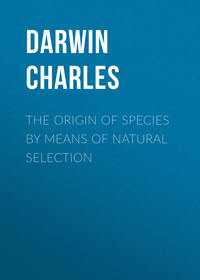 полная версия
полная версияLife and Letters of Charles Darwin — Volume 1
II. Now, suppose there was a being, who did not judge by mere external appearance, but could study the whole internal organisation — who never was capricious — who should go on selecting for one end during millions of generations, who will say what he might not effect! In nature we have some SLIGHT variations, occasionally in all parts: and I think it can be shown that a change in the conditions of existence is the main cause of the child not exactly resembling its parents; and in nature, geology shows us what changes have taken place, and are taking place. We have almost unlimited time: no one but a practical geologist can fully appreciate this: think of the Glacial period, during the whole of which the same species of shells at least have existed; there must have been during this period, millions on millions of generations.
III. I think it can be shown that there is such an unerring power at work, or NATURAL SELECTION (the title of my book), which selects exclusively for the good of each organic being. The elder De Candolle, W. Herbert, and Lyell, have written strongly on the struggle for life; but even they have not written strongly enough. Reflect that every being (even the elephant) breeds at such a rate that, in a few years, or at most a few centuries or thousands of years, the surface of the earth would not hold the progeny of any one species. I have found it hard constantly to bear in mind that the increase of every single species is checked during some part of its life, or during some shortly recurrent generation. Only a few of those annually born can live to propagate their kind. What a trifling difference must often determine which shall survive and which perish.
IV. Now take the case of a country undergoing some change; this will tend to cause some of its inhabitants to vary slightly; not but what I believe most beings vary at all times enough for selection to act on. Some of its inhabitants will be exterminated, and the remainder will be exposed to the mutual action of a different set of inhabitants, which I believe to be more important to the life of each being than mere climate. Considering the infinitely various ways beings have to obtain food by struggling with other beings, to escape danger at various times of life, to have their eggs or seeds disseminated, etc., etc., I cannot doubt that during millions of generations individuals of a species will be born with some slight variation profitable to some part of its economy; such will have a better chance of surviving, propagating this variation, which again will be slowly increased by the accumulative action of natural selection; and the variety thus formed will either coexist with, or more commonly will exterminate its parent form. An organic being like the woodpecker, or the mistletoe, may thus come to be adapted to a score of contingencies; natural selection, accumulating those slight variations in all parts of its structure which are in any way useful to it, during any part of its life.
V. Multiform difficulties will occur to every one on this theory. Most can, I think, be satisfactorily answered. — "Natura non facit saltum" answer some of the most obvious. The slowness of the change, and only a very few undergoing change at any one time answers others. The extreme imperfections of our geological records answers others.
VI. One other principle, which may be called the principle of divergence, plays, I believe, an important part in the origin of species. The same spot will support more life if occupied by very diverse forms: we see this in the many generic forms in a square yard of turf (I have counted twenty species belonging to eighteen genera), or in the plants and insects, on any little uniform islet, belonging to almost as many genera and families as to species. We can understand this with the higher animals, whose habits we best understand. We know that it has been experimentally shown that a plot of land will yield a greater weight, if cropped with several species of grasses, than with two or three species. Now every single organic being, by propagating rapidly, may be said to be striving its utmost to increase in numbers. So it will be with the offspring of any species after it has broken into varieties, or sub-species, or true species. And it follows, I think, from the foregoing facts, that the varying offspring of each species will try (only a few will succeed) to seize on as many and as diverse places in the economy of nature as possible. Each new variety or species when formed will generally take the place of, and so exterminate its less well-fitted parent. This, I believe, to be the origin of the classification or arrangement of all organic beings at all times. These always SEEM to branch and sub-branch like a tree from a common trunk; the flourishing twigs destroying the less vigorous — the dead and lost branches rudely representing extinct genera and families.
This sketch is MOST imperfect; but in so short a space I cannot make it better. Your imagination must fill up many wide blanks. Without some reflection, it will appear all rubbish; perhaps it will appear so after reflection.
C.D.
P.S. — This little abstract touches only the accumulative power of natural selection, which I look at as by far the most important element in the production of new forms. The laws governing the incipient or primordial variation (unimportant except as the groundwork for selection to act on, in which respect it is all important), I shall discuss under several heads, but I can come, as you may well believe, only to very partial and imperfect conclusions.
[The joint paper of Mr. Wallace and my father was read at the Linnean Society on the evening of July 1st. Sir Charles Lyell and Sir J.D. Hooker were present, and both, I believe, made a few remarks, chiefly with a view of impressing on those present the necessity of giving the most careful consideration to what they had heard. There was, however, no semblance of a discussion. Sir Joseph Hooker writes to me: "The interest excited was intense, but the subject was too novel and too ominous for the old school to enter the lists, before armouring. After the meeting it was talked over with bated breath: Lyell's approval, and perhaps in a small way mine, as his lieutenant in the affair, rather overawed the Fellows, who would otherwise have flown out against the doctrine. We had, too, the vantage ground of being familiar with the authors and their theme."]
CHARLES DARWIN TO J.D. HOOKER. Down, July 5th [1858].
My dear Hooker,
We are become more happy and less panic-struck, now that we have sent out of the house every child, and shall remove H.,as soon as she can move. The first nurse became ill with ulcerated throat and quinsey, and the second is now ill with the scarlet fever, but, thank God, is recovering. You may imagine how frightened we have been. It has been a most miserable fortnight. Thank you much for your note, telling me that all had gone on prosperously at the Linnean Society. You must let me once again tell you how deeply I feel your generous kindness and Lyell's on this occasion. But in truth it shames me that you should have lost time on a mere point of priority. I shall be curious to see the proofs. I do not in the least understand whether my letter to A. Gray is to be printed; I suppose not, only your note; but I am quite indifferent, and place myself absolutely in your and Lyell's hands.
I can easily prepare an abstract of my whole work, but I can hardly see how it can be made scientific for a Journal, without giving facts, which would be impossible. Indeed, a mere abstract cannot be very short. Could you give me any idea how many pages of the Journal could probably be spared me?
Directly after my return home, I would begin and cut my cloth to my measure. If the Referees were to reject it as not strictly scientific, I could, perhaps publish it as a pamphlet.
With respect to my big interleaved abstract (The Sketch of 1844.), would you send it any time before you leave England, to the enclosed address? If you do not go till August 7th-10th, I should prefer it left with you. I hope you have jotted criticisms on my MS. on big Genera, etc., sufficient to make you remember your remarks, as I should be infinitely sorry to lose them. And I see no chance of our meeting if you go soon abroad. We thank you heartily for your invitation to join you: I can fancy nothing which I should enjoy more; but our children are too delicate for us to leave; I should be mere living lumber.
Lastly, you said you would write to Wallace; I certainly should much like this, as it would quite exonerate me: if you would send me your note, sealed up, I would forward it with my own, as I know the address, etc.
Will you answer me sometime about your notions of the length of my abstract.
If you see Lyell, will you tell him how truly grateful I feel for his kind interest in this affair of mine. You must know that I look at it, as very important, for the reception of the view of species not being immutable, the fact of the greatest Geologist and Botanist in England taking ANY SORT OF INTEREST in the subject: I am sure it will do much to break down prejudices.
Yours affectionately, C. DARWIN.
CHARLES DARWIN TO J.D. HOOKER. Miss Wedgwood's, Hartfield, Tunbridge Wells, [July 13th, 1858].
My dear Hooker,
Your letter to Wallace seems to me perfect, quite clear and most courteous. I do not think it could possibly be improved, and I have to day forwarded it with a letter of my own. I always thought it very possible that I might be forestalled, but I fancied that I had a grand enough soul not to care; but I found myself mistaken and punished; I had, however, quite resigned myself, and had written half a letter to Wallace to give up all priority to him, and should certainly not have changed had it not been for Lyell's and your quite extraordinary kindness. I assure you I feel it, and shall not forget it. I am MORE than satisfied at what took place at the Linnean Society. I had thought that your letter and mine to Asa Gray were to be only an appendix to Wallace's paper.
We go from here in a few days to the sea-side, probably to the Isle of Wight, and on my return (after a battle with pigeon skeletons) I will set to work at the abstract, though how on earth I shall make anything of an abstract in thirty pages of the Journal, I know not, but will try my best. I shall order Bentham; is it not a pity that you should waste time in tabulating varieties? for I can get the Down schoolmaster to do it on my return, and can tell you all the results.
I must try and see you before your journey; but do not think I am fishing to ask you to come to Down, for you will have no time for that.
You cannot imagine how pleased I am that the notion of Natural Selection has acted as a purgative on your bowels of immutability. Whenever naturalists can look at species changing as certain, what a magnificent field will be open, — on all the laws of variation, — on the genealogy of all living beings, — on their lines of migration, etc., etc. Pray thank Mrs. Hooker for her very kind little note, and pray, say how truly obliged I am, and in truth ashamed to think that she should have had the trouble of copying my ugly MS. It was extraordinarily kind in her. Farewell, my dear kind friend.
Yours affectionately, C. DARWIN.
P.S. — I have had some fun here in watching a slave-making ant; for I could not help rather doubting the wonderful stories, but I have now seen a defeated marauding party, and I have seen a migration from one nest to another of the slave-makers, carrying their slaves (who are HOUSE, and not field niggers) in their mouths!
I am inclined to think that it is a true generalisation that, when honey is secreted at one point of the circle of the corolla, if the pistil bends, it always bends into the line of the gangway to the honey. The Larkspur is a good instance, in contrast to Columbine, — if you think of it, just attend to this little point.
CHARLES DARWIN TO C. LYELL. King's Head Hotel, Sandown, Isle of Wight, July 18th [1858].
...We are established here for ten days, and then go on to Shanklin, which seems more amusing to one, like myself, who cannot walk. We hope much that the sea may do H. and L. good. And if it does, our expedition will answer, but not otherwise.
I have never half thanked you for all the extraordinary trouble and kindness you showed me about Wallace's affair. Hooker told me what was done at the Linnean Society, and I am far more than satisfied, and I do not think that Wallace can think my conduct unfair in allowing you and Hooker to do whatever you thought fair. I certainly was a little annoyed to lose all priority, but had resigned myself to my fate. I am going to prepare a longer abstract; but it is really impossible to do justice to the subject, except by giving the facts on which each conclusion is grounded, and that will, of course, be absolutely impossible. Your name and Hooker's name appearing as in any way the least interested in my work will, I am certain, have the most important bearing in leading people to consider the subject without prejudice. I look at this as so very important, that I am almost glad of Wallace's paper for having led to this.
My dear Lyell, yours most gratefully, CH. DARWIN.
[The following letter refers to the proof-sheets of the Linnean paper. The 'introduction' means the prefatory letter signed by Sir C. Lyell and Sir J.D. Hooker.]
CHARLES DARWIN TO J.D. HOOKER. King's Head Hotel, Sandown, Isle of Wight, July 21st [1858].
My dear Hooker,
I received only yesterday the proof-sheets, which I now return. I think your introduction cannot be improved.
I am disgusted with my bad writing. I could not improve it, without rewriting all, which would not be fair or worth while, as I have begun on a better abstract for the Linnean Society. My excuse is that it NEVER was intended for publication. I have made only a few corrections in the style; but I cannot make it decent, but I hope moderately intelligible. I suppose some one will correct the revise. (Shall I?)
Could I have a clean proof to send to Wallace?
I have not yet fully considered your remarks on big genera (but your general concurrence is of the HIGHEST POSSIBLE interest to me); nor shall I be able till I re-read my MS.; but you may rely on it that you never make a remark to me which is lost from INATTENTION. I am particularly glad you do not object to my stating your objections in a modified form, for they always struck me as very important, and as having much inherent value, whether or no they were fatal to my notions. I will consider and reconsider all your remarks...
I have ordered Bentham, for, as — says, it will be very curious to see a Flora written by a man who knows nothing of British plants!!
I am very glad at what you say about my Abstract, but you may rely on it that I will condense to the utmost. I would aid in money if it is too long. (That is to say, he would help to pay for the printing, if it should prove too long for the Linnean Society.) In how many ways you have aided me!
Yours affectionately, C. DARWIN.
[The 'Abstract' mentioned in the last sentence of the preceding letter was in fact the 'Origin of Species,' on which he now set to work. In his 'Autobiography' he speaks of beginning to write in September, but in his Diary he wrote, "July 20 to August 12, at Sandown, began Abstract of Species book." "September 16, Recommenced Abstract." The book was begun with the idea that it would be published as a paper, or series of papers, by the Linnean Society, and it was only in the late autumn that it became clear that it must take the form of an independent volume.]
CHARLES DARWIN TO J.D. HOOKER. Norfolk House, Shanklin, Isle of Wight, Friday [July] 30th [1858].
My dear Hooker,
Will you give the enclosed scrap to Sir William to thank him for his kindness; and this gives me an excuse to amuse myself by writing to you a note, which requires no answer.
This is a very charming place, and we have got a very comfortable house. But, alas, I cannot say that the sea has done H. or L. much good. Nor has my stomach recovered from all our troubles. I am very glad we left home, for six children have now died of scarlet fever in Down. We return on the 14th of August.
I have got Bentham ('British Flora.'), and am charmed with it, and William (who has just started for a tour abroad) has been making out all sorts of new (to me) plants capitally. The little scraps of information are so capital...The English names in the analytical keys drive us mad: give them by all means, but why on earth [not] make them subordinate to the Latin; it puts me in a passion. W. charged into the Compositae and Umbelliferae like a hero, and demolished ever so many in grand style.
I pass my time by doing daily a couple of hours of my Abstract, and I find it amusing and improving work. I am now most heartily obliged to you and Lyell for having set me on this; for I shall, when it is done, be able to finish my work with greater ease and leisure. I confess I hated the thought of the job; and now I find it very unsatisfactory in not being able to give my reasons for each conclusion.
I will be longer than I expected; it will take thirty-five of my MS. folio pages to give an abstract on variation under domestication alone; but I will try to put in nothing which does not seem to me of some interest, and which was once new to me. It seems a queer plan to give an abstract of an unpublished work; nevertheless, I repeat, I am extremely glad I have begun in earnest on it.
I hope you and Mrs. Hooker will have a very very pleasant tour. Farewell, my dear Hooker.
Yours affectionately, C. DARWIN.
CHARLES DARWIN TO J.D. HOOKER. Norfolk House, Shanklin, Isle of Wight, Thursday [August 5, 1858].
My dear Hooker,
I should think the note apologetical about the style of the abstract was best as a note...But I write now to ask you to send me by return of post the MS. on big genera, that I may make an abstract of a couple of pages in length. I presume that you have quite done with it, otherwise I would not for anything have it back. If you tie it with string, and mark it MS. for printing, it will not cost, I should think, more than 4 pence. I shall wish much to say that you have read this MS. and concur; but you shall, before I read it to the Society, hear the sentence.
What you tell me after speaking with Busk about the length of the Abstract is an IMMENSE relief to me; it will make the labour far less, not having to shorten so much every single subject; but I will try not to be too diffusive. I fear it will spoil all interest in my book (The larger book begun in 1856.), whenever published. The Abstract will do very well to divide into several parts: thus I have just finished "Variation under Domestication," in forty-four MS. pages, and that would do for one evening; but I should be extremely sorry if all could not be published together.
What else you say about my Abstract pleases me highly, but frightens me, for I fear I shall never be able to make it good enough. But how I do run on about my own affairs to you!
I was astonished to see Sir W. Hooker's card here two or three days ago: I was unfortunately out walking. Henslow, also, has written to me, proposing to come to Down on the 9th, but alas, I do not return till the 13th, and my wife not till a week later; so that I am also most sorry to think I shall not see you, for I should not like to leave home so soon. I had thought of going to London and running down for an hour or two to Kew...
CHARLES DARWIN TO J.D. HOOKER. Norfolk House, Shanklin, Isle of Wight, [August] [1858].
My dear Hooker,
I write merely to say that the MS. came safely two or three days ago. I am much obliged for the correction of style: I find it unutterably difficult to write clearly. When we meet I must talk over a few points on the subject.
You speak of going to the sea-side somewhere; we think this the nicest seaside place which we have ever seen, and we like Shanklin better than other spots on the south coast of the island, though many are charming and prettier, so that I would suggest your thinking of this place. We are on the actual coast; but tastes differ so much about places.
If you go to Broadstairs, when there is a strong wind from the coast of France and in fine, dry, warm weather, look out, and you will PROBABLY (!) see thistle-seeds blown across the Channel. The other day I saw one blown right inland, and then in a few minutes a second one and then a third; and I said to myself, God bless me, how many thistles there must be in France; and I wrote a letter in imagination to you. But I then looked at the LOW clouds, and noticed that they were not coming inland, so I feared a screw was loose. I then walked beyond a headland, and found the wind parallel to the coast, and on this very headland a noble bed of thistles, which by every wide eddy were blown far out to sea, and then came right in at right angles to the shore! One day such a number of insects were washed up by the tide, and I brought to life thirteen species of Coleoptera; not that I suppose these came from France. But do you watch for thistle-seed as you saunter along the coast...
CHARLES DARWIN TO ASA GRAY. August 11th [1858].
My dear Gray,
Your note of July 27th has just reached me in the Isle of Wight. It is a real and great pleasure to me to write to you about my notions; and even if it were not so, I should be a most ungrateful dog, after all the invaluable assistance you have rendered me, if I did not do anything which you asked.
I have discussed in my long MS. the later changes of climate and the effect on migration, and I will here give you an ABSTRACT of an ABSTRACT (which latter I am preparing of my whole work for the Linnean Society). I cannot give you facts, and I must write dogmatically, though I do not feel so on any point. I may just mention, in order that you may believe that I have SOME foundation for my views, that Hooker has read my MS., and though he at first demurred to my main point, he has since told me that further reflection and new facts have made him a convert.
In the older, or perhaps newer, Pliocene age (a little BEFORE the Glacial epoch) the temperature was higher; of this there can be little doubt; the land, on a LARGE SCALE, held much its present disposition: the species were mainly, judging from shells, what they are now. At this period when all animals and plants ranged 10 or 15 degrees nearer the poles, I believe the northern part of Siberia and of North America being almost CONTINUOUS, were peopled (it is quite possible, considering the shallow water, that Behring Straits were united, perhaps a little southward) by a nearly uniform fauna and flora, just as the Arctic regions now are. The climate then became gradually colder till it became what it now is; and then the temperate parts of Europe and America would be separated, as far as migration is concerned, just as they now are. Then came on the Glacial period, driving far south all living things; middle or even southern Europe being peopled with Arctic productions; as the warmth returned, the Arctic productions slowly crawled up the mountains as they became denuded of snow; and we now see on their summits the remnants of a once continuous flora and fauna. This is E. Forbes' theory, which, however, I may add, I had written out four years before he published.
Some facts have made me vaguely SUSPECT that between the glacial and the present temperature there was a period of SLIGHTLY greater warmth. According to my modification-doctrines, I look at many of the species of North America which CLOSELY represent those of Europe, as having become modified since the Pliocene period, when in the northern part of the world there was nearly free communication between the old and new worlds. But now comes a more important consideration; there is a considerable body of geological evidence that during the Glacial epoch the whole world was colder; I inferred that, many years ago, from erratic boulder phenomena carefully observed by me on both the east and west coast of South America. Now I am so bold as to believe that at the height of the Glacial epoch, AND WHEN ALL TROPICAL PRODUCTIONS MUST HAVE BEEN CONSIDERABLY DISTRESSED, that several temperate forms slowly travelled into the heart of the Tropics, and even reached the southern hemisphere; and some few southern forms penetrated in a reverse direction northward. (Heights of Borneo with Australian forms, Abyssinia with Cape forms.) Wherever there was nearly continuous HIGH land, this migration would have been immensely facilitated; hence the European character of the plants of Tierra del Fuego and summits of Cordilleras; hence ditto on Himalaya. As the temperature rose, all the temperate intruders would crawl up the mountains. Hence the European forms on Nilgherries, Ceylon, summit of Java, Organ Mountains of Brazil. But these intruders being surrounded with new forms would be very liable to be improved or modified by natural selection, to adapt them to the new forms with which they had to compete; hence most of the forms on the mountains of the Tropics are not identical, but REPRESENTATIVE forms of North temperate plants.









